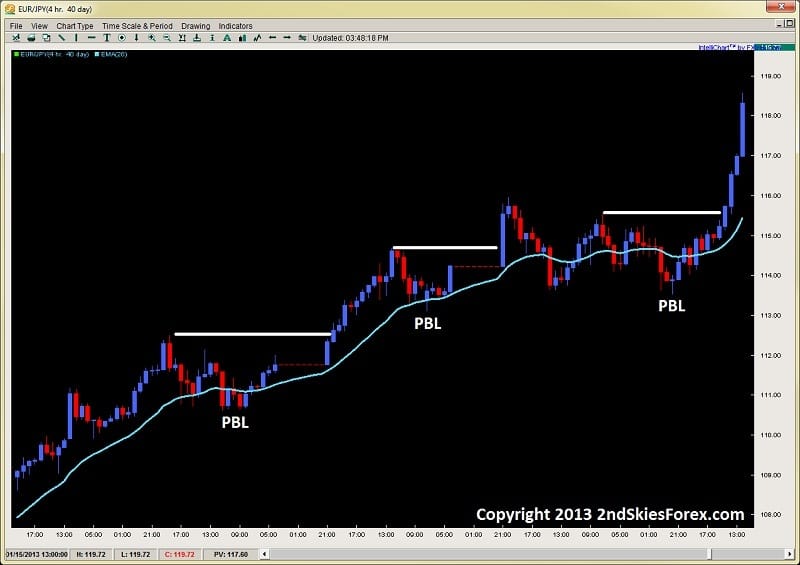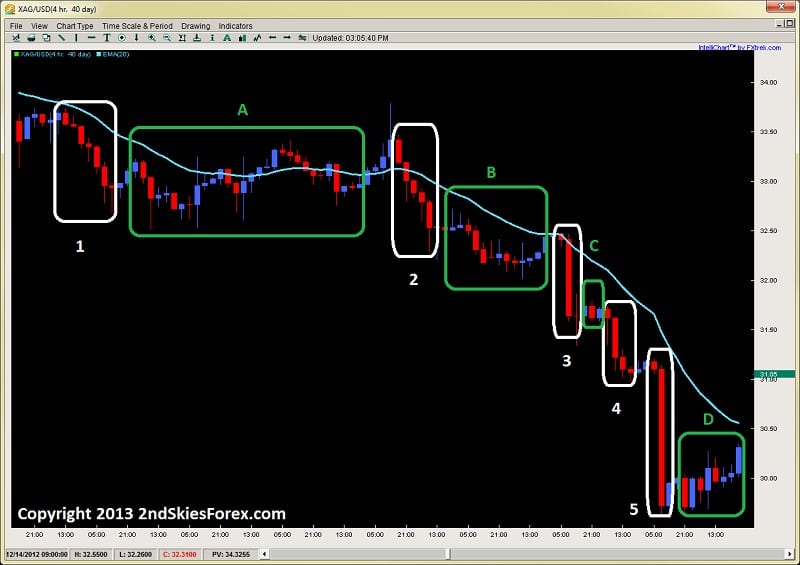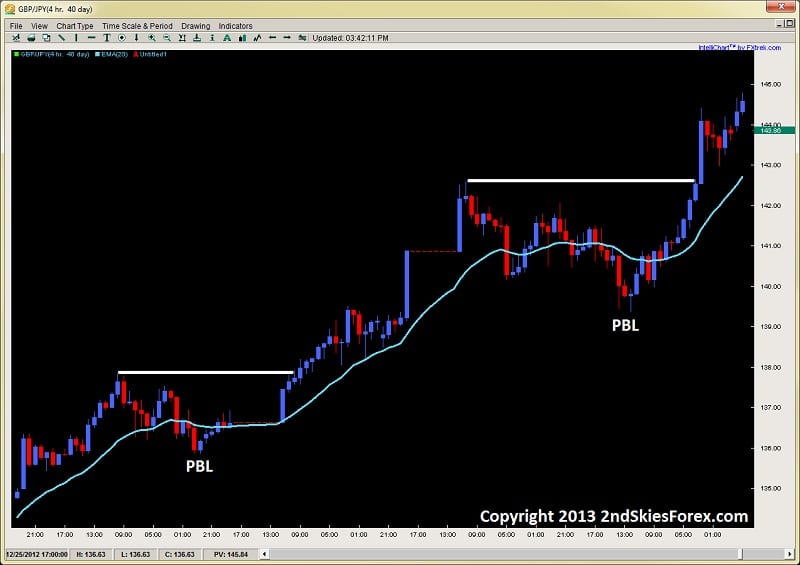2 Price Action Tips For Beginning Traders
Today’s price action tip article is designed to give any beginning, or non-profitable trader, 2 critical tips to help accelerate your learning curve and avoid the pitfalls almost everyone falls into. If you can learn to follow these two beginner forex trading tips, then you will find yourself making more winning trades, along with less mistakes that tend to get you in trouble.
Trading is already hard enough, regardless of your level, so integrating these two tips will help you to make more winning trades.
Tip #1: Trade Only When The Price Action & Direction Is Clear
Although this may seem confusing for the beginner, as price action rarely seems clear, there is actually a simple model to determine whether the price action and direction is clear.
The model I use daily to determine the direction/clarity of the market is looking for impulsive price action moves. To briefly sum it up, impulsive price action is when the institutional players (those that move the market) are either heavily buying or heavily selling the market. You can spot these moves by three simple characteristics;
1) The bars are quite large
2) They are mostly one color
3) They have closes towards the highs or lows (in the direction of the move)
When you see these three things, you almost always have an impulsive move. And when you have an impulsive move, those that move the market are predominantly pushing it in one direction, which is the direction you want to trade with. When you can find the correct direction, and trade it, you give yourself the greatest probability of making money.
An example of some impulsive moves are below, and you will see when looking at the chart, you will definitely want to be trading in that direction.
Looking at the chart above, you will see two colors of boxes; White and Green. If you look at all the white boxes above, you will all notice they have the three characteristics of impulsive moves described above.
Compare them to the green boxes – these have the opposite of the 3 characteristics of impulsive moves. These are called corrective moves, and for beginning traders, they should be avoided as a whole. When in doubt, if you do not have a clear market or impulsive moves, avoid trading.
Often times for beginning traders, finding the right direction is difficult, and it seems like you tend to find the opposite side of the move. By learning to only trade with impulsive moves and the price action is clear, you are saying to yourself, ‘I’m only going to fish when the easy fish are around’.
Tip #2: When Trend Trading – Best to Buy or Sell When the Prior Bar Closes in Your Direction
This is a general rule I suggest to use until you get really good at trading trends. The reason for this is simple;
a) If you are looking to buy in an uptrend, you have a greater chance of being correct when the last bar to close, closed bullish.
b) If you are looking to sell in a downtrend, you have the greater chance of being correct when the last bar to close, closed bearish
If you think about it – when looking to buy in an uptrend and the last bar closed bullish, it is a confirmation for the last candle (and time), the bulls were in control. This bullish close is more likely to inspire bulls the trend is still alive.
Contrast this to buying when the bears demonstrated control on the last bar. This means they dominated the order flow for that bar, and may be pushing against your orders. This increases the chance the bulls will take profit after seeing a bear bar as opposed to a bull bar (continuation).
However, if the bulls demonstrated control on the last bar, then they are likely still present pushing the market in your favor, so this gives you a greater probability to have follow through on your trade when you enter the market.
Two examples are below.
In this chart, we clearly have an uptrend, which offers a couple of with trend pullbacks. In these pullbacks, you will see two PBL’s (Pullback Lows), which led to a breakout of the prior SH (Swing High) for the trend. You will notice in both of them, the low for the pullback was a bull candle, and the follow up price action was a strong series of bull candles to follow.
Another example is in the chart below on the EURJPY 4hr Chart

In this chart, we have 3 major with trend pullbacks, and in two out of three of them, the PBL’s had a bull bar at the bottom, also demonstrating this principle. As a general rule, bulls will feel more confident buying a pullback (or breakout) in a trend, when the last bar closed bullish. This is a stronger communication the bulls have been able to take control of the price action and order flow for the last bar.
In Summary
Trading is already challenging enough, and finding the right direction is one of the most crucial aspects to making good trades. In the beginning, you already have enough to think about, so try to keep it simple, and trade when the direction is clear. Look for impulsive price action moves as much as possible, and when you find them, trade in that direction.
However, when the price action is not clear, try to stay out until a clear signal and market emerges.
When trend trading, you have a much better chance in the beginning, if you buy/sell when the last bar closes in your direction. This closing in your direction is a clearer communication from the market, the bulls/bears are more likely in control, and in your favor.
I hope these two beginner forex trading tips help you.
To learn more price action techniques and systems, make sure to check out my price action course where I have a large community of traders, posting live trade setups daily, and I teach them how to read and trade price action.



Great Article ,
Thanks Chris
Glad you liked it Ro.
Kind Regards,
Chris
superb artical chris….
thank u very much
Thank you so very much for this concise, detailed and well-explained article for us. It is indeed very effective and useful for beginners like myself!
Once again, thank you and appreciate it greatly Chris!
greetings from Singapore,
Javier Lee
Hello Javier,
Am glad you liked this article as it covers probably the most important model and topic for trading price action.
Kind Regards,
Chris Capre
spot on here Ro very helpfull
Hi Chris, I’m a newbie. Coming across your website is just great. The article? mmmmh!!! Thanks a lot. Cheers.
Hello Timoth,
Glad you liked it and found it useful.
Kind Regards,
Chris Capre
Are your entries at the previous swing high and your stop at the swing low
Great Article SIR,
You are a master of craft. Master of PA.
Most important thing really is The Price Action aligned with Direction.
How to identify impulsive move and corrective move in our chart?
Hi Chris,
Great article about finding the right direction. However: I find your second tip “to buy/sell when the prior bar closed in your direction” difficult to understand in view of multiple time frames.
MT4, for example, has a 1M, 5M, 15M, 30M, 1H, 4H, Daily, Weekly and Monthly time frame charts. With regards to your second tip, which time frame are you referring to?
When trading on the 5M chart, for example, a bar (or even two or three bars) may close bullish but when you switch to the 1H chart the 1 hour bar may still be forming and when it completes it may close bearish.
The same is true for all other time frames. Hence I need clarification as to which time frame you primarily look at to determine the close of the prior bar.
Related to this, the impulsive moves your talking about: can I look for them on lower time frames like the 5M chart? Or are they reliable on the higher time frames like the 1H, 4H or Daily charts?
Hello Paul,
Good to hear from you as its been a few months since you last chimed in.
RE: Your Questions
1) You can look for impulsive moves on any time frame.
2) I don’t have one specific time frame I trade.
I find opportunities on all time frames. We teach you how to understand price action context across multiple time frames in our price action course which you are welcome to join and get more personal access to me.
Kind Regards,
Chris Capre
Hello Mr Chris,
Comparing to other PA Teaching sites, I found your teaching is the best of all, so i decided to stop following other teaching and to follow only yours. now I am gaining real confidence about your teaching and profitability of trading in side of me, and looking forward to join your PA course as soon as possible.
Hi Chris, i enjoyed your article >understanding impulsive and corrective price action. It is great.
Thanks,
Collins Odu.
Hello Collins Odu,
Glad you liked the article. Yes – impulsive and corrective price action is key so am glad you tuned into that.
Kind Regards,
Chris Capre
Thanks, this was very helpful, I am a new bee, trying to learn about trading.
Hello Sohail,
Good to hear you found it helpful. There is plenty of free material here to give you a solid base for trading price action that is unique from the other cookie-cutter versions of what is out there.
So if you want to learn a different perspective, keep on truckin!
Kind Regards,
Chris Capre
You are great!!!
Class I presentation!
Let price be within reach(pristine products)
Great article Chris, solid foundation info for the beginner Forex trader.
Regards
imil
Hello Imil,
Glad you found it helpful.
Kind Regards,
Chris Capre
Great article Chris, I’ve been reading a lot in this last months, and the way you express yourself and the way you teach, it’s the best I found and match on me.
I just joined your PA course and I’m happy about it.
I’ve learned more in two weeks than in 6 months of trading.
Regards from Valencia,
Vicente
Hola Vicente,
Como te va?
I’m glad you like the way I teach and are happy about joining the APA course.
There is more to learn as we’re adding new lessons shortly so stay tuned.
These 2 tips are very helpful. I believe I would have been stopped out less often buying into pullbacks if I had applied Tip #2 to my trading. Thanks Chris!
Hello Liz,
Yes, these 2 tips can save you a lot of money while trading if applied well so glad you caught onto this.
Thanks Chris. I need to reread this article a few times to fully digest it. I’ll be back
Hi Chris, is the entry at the breakout of the white line?
Hi Chris you always speak that usually after an impulsive mode There is a correttive move (range) and then another impulsive mode in the same trend direction of the first impulsive mode. But if it so have we never a trend reversal? Thank you
Hello Fabrizio,
I think you’re misunderstanding here. You have to look at things ‘probablistically’. When we talk about impulsive moves are ‘more often’ followed by corrective moves, we are speaking ‘probablistically’.
Also, if the impulsive move is with trend, and is followed by a corrective move, the more ‘probable’ next move is an impulsive move with trend.
So you can’t think of these things as ‘certainties’, nor do we talk about them that way.
We are speaking in terms of probabilities.
Hopefully this clarifies it.
Yes this is effective! Totally agree in this strategy. Me as well I use H4 chart and impulsive-corrective movements to determine my entry. Nice article!
Hola Rick,
Nice, am glad you are liking this price action strategy. It can be used on any time frame, instrument or environment so a key skill to learn.
Hey Chris!!! That’s an awesome tip!!! I can’t wait to work on your course in May!!! This has answered a big question for me. Huge. I prefer longer swings but on the occasional scalp this is helpful on the smaller TF. Great track record on Forex btw!
Thanks Spaul.
Am glad it helped and looking forward to working with you soon.